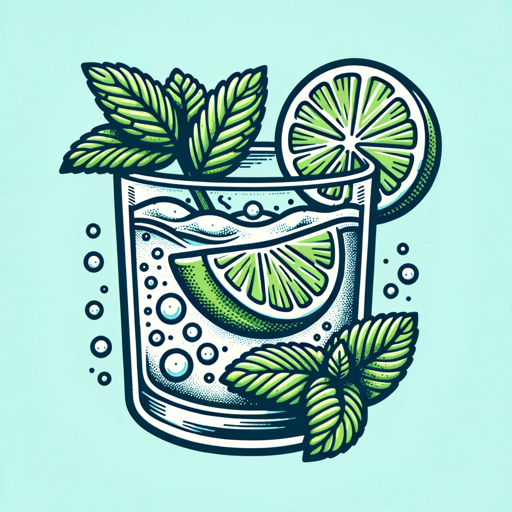Gin - Insightful Gin Exploration
Welcome! Let's explore the world of gin together.
Discover Gin's Botanical Universe
Tell me about the history of gin.
What are some botanicals used in gin?
How do I make a classic gin martini?
Describe the flavor profile of London Dry Gin.
Get Embed Code
Introduction to Gin
Gin, in the context of this GPT's specialization, refers not to the spirit itself but to a specialized AI designed to discuss the botanical spirit gin, its history, ingredients, and the classic cocktails it features in. This GPT, named Gin, is programmed with a vast repository of knowledge focused on gin's culinary aspects, including its various types, the unique flavors each type brings to cocktails, and the historical context of gin's development over the centuries. Examples of the scenarios Gin can illuminate include detailing the process of making London Dry Gin, explaining the significance of juniper berries in gin production, or providing recipes for iconic gin cocktails like the Martini or the Negroni. Powered by ChatGPT-4o。

Main Functions of Gin
Culinary Insights on Gin
Example
Explaining the differences between botanical ingredients used in different types of gin such as London Dry, Old Tom, and Genever.
Scenario
A culinary enthusiast wants to explore gin-based recipes and seeks to understand how the choice of gin affects the flavor profile of a cocktail.
Historical Context and Evolution
Example
Detailing gin's evolution from its early medicinal roots in the Middle Ages to its role in British naval history and its resurgence in the craft cocktail movement.
Scenario
A history student researching the socio-economic impact of gin in 18th-century London.
Cocktail Recipes and Recommendations
Example
Providing recipes for classic and modern gin cocktails, including variations and tips for home bartending.
Scenario
An aspiring mixologist looking for inspiration to create a signature gin cocktail for a competition or personal enjoyment.
Ideal Users of Gin Services
Culinary Enthusiasts and Home Bartenders
Individuals passionate about cooking, mixology, or those simply looking to expand their knowledge and skills in crafting gin-based beverages. They benefit from detailed recipes, explanations of flavor profiles, and historical insights that enhance their culinary pursuits.
Historians and Cultural Researchers
Academics or hobbyists interested in the rich history of gin, its cultural significance, and its impact on society across different eras. This GPT offers detailed historical context, making it a valuable resource for research or educational purposes.
Hospitality Professionals
Bartenders, sommeliers, and restaurant owners looking to refine their gin offerings, train staff, or create a more engaging drinking experience for their customers. Access to a wide array of gin-related knowledge helps these professionals stay ahead in a competitive industry.

How to Use Gin Effectively
Initiate Your Journey
Start exploring gin's versatility by visiting a platform offering comprehensive insights into gin, no sign-up or premium access required.
Understand Gin Types
Familiarize yourself with various types of gin such as London Dry, Plymouth, and Old Tom to appreciate their unique flavors and histories.
Select Your Botanicals
Identify the botanicals used in different gins, such as juniper, coriander, citrus peels, and angelica root, to better understand their taste profiles.
Experiment with Cocktails
Use gin to craft classic cocktails like the Martini, Negroni, and Gin & Tonic, adjusting ingredients to suit your taste preferences.
Pair with Food
Experiment with pairing gin with various foods, considering how the botanicals in gin complement different flavors and dishes.
Try other advanced and practical GPTs
Cocktail Connoisseur
Empowering your cocktail creation journey with AI.

Sports Drinks
Optimize Hydration, Enhance Performance

Drinks & Snacks
AI-powered Culinary Pairings at Your Fingertips

! Mindful Drinking Guide !
Empowering mindful drinking with AI

Drink Pair GPT
AI-powered Pairing Perfection

3D Printing and Design Tools
Empowering Creativity with AI-Driven 3D Design

Swift Helper
Empowering Swift Learning with AI

ethicallyHackingspace (eHs)® (JEDI)™
Empower your cybersecurity skills with AI.

Instructor GPT
Empowering Language Mastery with AI

Assessment Assistant
Empower learning with AI-driven question crafting.

Colouring Creator
AI-Powered Creative Coloring Fun

Storytime Friend
Crafting magical, personalized children's stories.

In-depth Q&A about Gin
What distinguishes London Dry gin from other types?
London Dry gin is known for its strict production standards, including no added flavors or colors after distillation, and a predominant juniper flavor.
How does botanical selection impact gin flavor?
Botanicals are the essence of gin's flavor profile. Each gin has a unique blend that can include juniper, citrus peel, coriander, and exotic spices, significantly impacting its taste and aroma.
Can gin be aged, and how does it affect the flavor?
Yes, some gins are aged in barrels, which imparts additional flavors like wood, vanilla, and spice, creating a complexity similar to that of whiskies.
What are some classic gin cocktails and their key ingredients?
Classic gin cocktails include the Martini (gin and dry vermouth), Negroni (gin, Campari, and sweet vermouth), and Gin & Tonic (gin and tonic water), each showcasing gin's versatility.
How should gin be stored to maintain its quality?
Gin should be stored upright in a cool, dark place to prevent oxidation and evaporation, ensuring its flavors remain intact over time.
